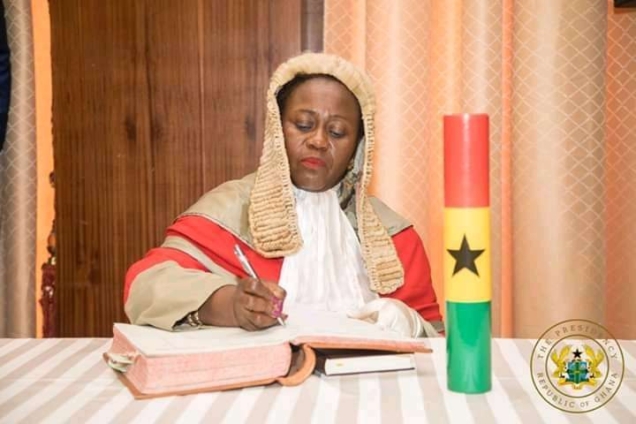Merely declaring cross-carpeting intention or going solo, not ground for vacating MP seat – SC explains why Bagbin got it wrong
 Chief Justice Gertrude Torkonoo
Chief Justice Gertrude Torkonoo
The Supreme Court (SC) has published its reasoning behind its 5-2 ruling in the Alexander Afenyo-Markin v Speaker of Parliament and Attorney General case, which nullified the Speaker of Parliament Alban Bagbin's declaration of four seats vacant in Parliament recently.
Parts of the 109-page ruling by the SC, dated November 12, 2024, provided "the proper interpretation to be placed on the provisions of Article 97(1)(g) & (h)" of the 1992 Constitution.
"As a preliminary step then, it is instructive first and foremost to refer to two key phrases 'leaves the party' appearing in the text of Article 97(1)(g) and 'joins a political party' appearing in the text of both Article 97(1)(g) and (h), which are particularly illuminating and critical to understanding the provisions," the statement said.
"Applying the known canons of interpretation including the purposive literalist interpretive approach, those phrases appearing in Article 97(1)(g) and (h) inherently imply a contemporaneous action by an MP to switch allegience to a different party while in Parliament. They do not show any prospective or anticipatory connotation. Simply put, the language used in Article 97(1)(g) and (h), conveys present and immediate actions, reflecting immediacy and contemporaneity, rather than a prospective event or futuristic occurrence."
The SC further explained, "...the only plausible conclusion which must necessarily flow from a holistic and contextual reading of Article 97(1)(g) and (h) is that an MP's seat shall be vacated upon departure from the cohort of his elected party in Parliament to join another party in Parliament while seeking to reamin in that Parliament as a member of the new party.
"Similarly, an independent MP who joins the cohort of a party in Parliament, while they remain Members of the Parliament for which they were elected as Independent Member, will have to vacate the seat tagged as that of an Independent Member."
"The central issue thus intended to be addressed by Article 97(1)(g) and (h), is not merely declaring the intention to join another party or the intention to become an independent MP in another Parliament, but becoming independent or becoming a member of another party while seeking to remain in Parliament during the term for which the MP was elected," the Chief Justice Gertrude Torkonoo-led SC emphasised.
By this reasoning, New Patriotic Party (NPP) MPs Cynthia Mamle Morrison for Agona West, and Kwadjo Asante for Suhum, who have revealed they will contest the upcoming parliamentary election as independent candidates, National Democratic Congress (NDC) MP Peter Kwakye-Ackah for Amenfi Central who has revealed he will contest the said election as an independent candidate, and Andrew Amoako Asiamah, MP for Fomena, an independent MP who has revealed he will contest the upcoming election as an NPP candidate, remain in their seats in the current Parliament.
Per Article 97(1), an MP shall vacate his seat in Parliament:
"(g) if he leaves the party of which he was a member at the time of his election to Parliament to join another party or seeks to remain in Parliament as an independent member; or
"(h) if he was elected a member of Parliament as an independent candidate and joins a political party.
Trending News

Government signs agreement with Health Services Workers Union, Internal Audit Agency
15:39
Nana Aba Anamoah commends Bawumia for free dialysis initiative
21:06
Akufo-Addo touts unprecedented achievements in Ghana's agriculture sector
09:33
Ho GPRTU boils as former executives lock up office
12:31
Ghana hosts major WHO-led simulation to combat future disease outbreaks in Africa
21:25
Akufo-Addo increases cocoa producer price, expands scholarship scheme for cocoa farmers' children
07:26
John Mahama begins two-day campaign tour in Western North Region
12:06
Dec 7 polls: NDC's Mahama tipped to win presidential vote, survey shows
21:48
Dec. 7 Polls: NPP will secure first-round victory – Chairman Wontumi
07:32
Bawumia joined NPP using forged party card-Asiedu Nketia alleges
11:51



